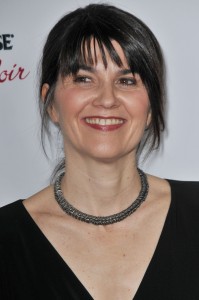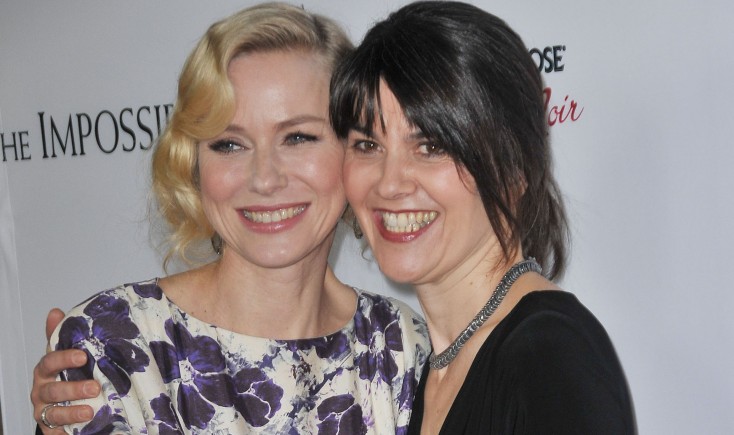
Maria Belon at “The Impossible” Los Angeles Premiere at the ArcLight Cinerama Dome in Los Angeles, CA held on December 10, 2012. ©Pacific Rim Photo Press.
By ANGELA DAWSON
Front Row Features
HOLLYWOOD—Maria Belon is more than just a tsunami survivor. She is a woman who has experienced a horrific tragedy and lived to tell the tale.
Her story is the subject of Juan Antonio Bayona’s “The Impossible,” an emotional and riveting account of the 2004 tsunami. It stars Naomi Watts and Ewan McGregor as a couple who become separated when the deadly wave strikes their tropical resort and washes them in different directions. They spend most of the movie trying to find each other and their three young children.
Belon is a petite dark haired woman originally from Spain, but who has lived in such diverse places as Mexico and Japan as the wife of business executive. She lost part of a leg in the tragedy, but miraculously (spoiler alert), she managed to reunite with the rest of her family by sheer luck. More than 283,000 died.
Belon, once a family doctor turned stay-at-home mom, emerged from the ordeal a different person. She is someone who has gained a greater respect for life, love and the power of nature.
She worked closely with the Spanish filmmaking team to tell her story and insists that 99 percent of what is depicted on screen actually happened. She met several times with the Oscar-nominated Watts, who plays her character (as an Englishwoman, one of the few changes) onscreen, and is happy with the result.
Q: Is the movie accurate?
Belon: Yes. They took very little dramatic license. In fact, it was much worse than shown. I told Juan Antonio that we didn’t need to make things up.
Q: How do you think you survived?
Belon: I have no explanation. I can’t waste time trying to explain why we survived when other mothers and fathers and children died. We just ask ourselves, what for? Not why. If you ask why, you can wind up in an area very dark, but we like to look upwards.
Q: Do you feel guilty that you survived?
Belon: No. It’s not guilt. It’s pain. It’s something that will remain with me for my life.
Q: Has the experience made your more spiritual or less spiritual?
Belon: I became very spiritual after (the tsunami). I lived through very deep spiritual moments but there is no God for me.
Q: How are your children? Have they recovered from this?
Belon: They’re incredibly brave. They are my masters. They’re the ones that push me all the time. They say, “Come on, mom. You can do it. You can talk to journalists,” and I say, “OK. OK. I’ll do it.” Lucas is being trained to be a doctor in London. Tomas wants to do community service. He got a scholarship to go to (college). He’s in Wales working as a lifeguard. The director (at his school) called me and asked me “Why is he so brave?” and I said, “I have no idea.” And Simon always asks me what is the best profession to help people.
Q: Were you brave before this incident?
Belon: I’m very strong but I’m also very weak. It’s the decisions you make; it’s not what you are.
Q: Have you seen the film?
Belon: Many times.
Q: How hard was it to watch it the first time?
Belon: It’s not hard to watch the physical pain that we went through but it’s very hard to watch what others went through.
Q: Naomi depicted your character as ready to give up by the time she reached the hospital. Did you feel that way? Were you ready to let go?
Belon: Yeah. But my husband wouldn’t let me. I was lucky that he wasn’t ready to let me go.
Q: How long was your recovery?
Belon: Physically? Two and a half years.
Q: How hard was it to watch what happened in Japan in 2011?
Belon: (choking up) It was very hard for me to watch because I don’t see numbers, I see people drowning. It’s very hard.
Q: You initially were reluctant to see this made into a movie so what changed your mind?
Belon: I came from the wave with so much presence that it was selfish to keep it to myself. I told the director (Juan Antonio Bayona), you have your reasons to make this and I have mine. We can have both.
Q: Have you written a book about your experience?
Belon: No. I’ve written thousands and thousands of pages, enough for a book, but I’m not interested in doing that. There is a film, a beautiful film.
Q: What specific ideas did you give Juan Antonio?
Belon: I told him I want you to put the audience under the wave, to make them feel like they are under the wave, so that when they surface, there is nothing to be said. You get the presence. People have told me that after they saw the movie, they went home and hugged their children. There’s nothing else to say.
Q: How closer do you feel to your husband and children after this experience?
Belon: We are normal. We argue about stupid things sometimes, but not seriously anymore. It matters when it matters.
Q: Do you think about it a lot?
Belon: I don’t think about it so much but I do feel it a lot.
Q: Do you have a special bond with your oldest son because you went through this ordeal with him?
Belon: We have a very very special bond. We don’t need to speak or tell each other we love each other. We don’t use many words but we hug a lot when we see each other.
Q: Did your medical background help you in the hospital?
Belon: I couldn’t speak very well so I had to be very precise with what I told the (medical staff) at the hospital. My English wasn’t very good and that was the common language we could speak there.
Q: Did you recover from your leg injury?
Belon: No. I’ve only got half my leg but it is the most beautiful leg on earth. My whole body is full of scars but I would say it’s beautiful.
Q: Was seeing your story made into a film therapeutic for you?
Belon: I don’t need to be healed. I don’t want to forget what happened because being close to what happened is great. The wave made everything clear to me—what it is to be alive.
Q: Did you ever get to thank the man that rescued you?
Belon: I tried but it was impossible to find him. I learned from him what generosity is. He taught me what generosity is about.
Q: What did Naomi ask you about?
Belon: She wanted to know everything. I said to her, “You’ll get everything” because I knew she wasn’t going to portray me but all the moms. So I told her I’ll give you everything and I think she got everything. I watch the movie and I see everything in her eyes. I wrote a letter to her after I watched the movie that read, “I once was there and I know how it feels, and it feels exactly how you played it.”
Q: Are you afraid of anything now?
Belon: No.





